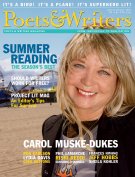Sunshine O'Donnell
Open Me
Publisher: MacAdam/Cage
Editor: Kate Nitze
Agent: Marianne Merola of Brandt & Hochman Literary Agents, Inc.
Format: Hardcover, simultaneous paperback
Pages: 225
Blurbs: Ann Hood, Cheryl Pearl Sucher
Deal: One book
Her name may be bright and cheery, but the premise of her debut novel is rather dark. Mem, the main character in Sunshine O'Donnell's debut novel, Open Me, is the last of the professional mourners—women who are hired to attend funerals and cry. Although the fictional narrative is set in present-day Philadelphia, the so-called wailers have a historical precedent, and O'Donnell blends this fact with fiction to explore themes of mortality, motherhood, and sexuality.
Already an award-winning poet, essayist, and teacher—she runs experiential workshops in creative writing, visual art, and quantum physics for children in schools throughout Pennsylvania, as well as a mobile-classroom program she founded in 1994—O'Donnell has added novelist to her resumé with a unique tale about crying that spans six thousand years.
What's the story behind the name Sunshine?
I was born in 1971 and my parents were hippies. After I was born, my parents hung a banner in the hospital room that said Good Day Sunshine! and had an astrologer come out to do my chart. You'd be surprised by how many of us there are, people in their thirties with names like Sunshine, Garden, Power, Autumn, who are constantly besieged with the question, "Is that your real name?" It definitely dates us. It was a tough name to have in the suburbs during the '80s, and I still think it's pretty silly, but I could never bring myself to change it. Today my students love calling me Miss Sunshine, and I don't mind at all when they do.
When did you begin writing Open Me?
I started in the fall of 1999, but I wasn't able to really sit down and seam it all together until I quit my job as a newspaper reporter in 2000. It had become impossible to spend all day producing easily digestible copy at a fifth-grade reading level and then come home and write anything of value. I had to make a major career change, a huge leap of faith that has turned out to be one of the best choices I've ever made. Once I didn't have to write for anyone but myself, the original version of the book, titled "The Salt Garden," took about six months to complete.
How did you learn about professional mourners?
I know I had heard of them before, but it wasn't until I read Tom Lutz's amazing nonfiction book Crying that I remembered that these women had existed. They're only briefly mentioned in Crying—in fact, they're only briefly mentioned everywhere I researched—but I found myself wondering what kind of training you would have to endure to be a really good professional mourner, how a mourner could become known as the best in her field, what it would be like to have that kind of profession now, in America. There were so many literary possibilities—it was like a plot and character smorgasbord.
How did it come to be published?
It took me longer to write my literary agency query letter than it did to write the book! I knew I had to seduce an agent within the first couple of lines or I would end up in the slush pile, so I spent months crafting that letter. My top two dream agencies responded positively, and I really jumped through hoops for a while in order to secure Marianne Merola at Brandt & Hochman Literary Agents. Marianne is tough and fabulous—honest, incredibly professional, and clearly someone who loves literature.
What were you doing when you first heard the book was accepted for publication?
I don't remember! The negotiation process took so long that between "I think we have an offer" and "I'm sending you the contracts," the fantasy I'd had since I was five years old about answering the phone and hearing, "We'd love to publish your book!" had disintegrated. Really, the jumping-up-and-down moment happened in the elevator right after Marianne agreed to represent me.
Which writers do you count as your literary influences?
The authors who have amazed me the most are Margaret Atwood, Sherman Alexie, Ann Beattie, Charles Bukowski, Italo Calvino, Michael Cunningham, Milan Kundera, Ian McEwan, Pablo Neruda, Sylvia Plath, Jeanette Winterson, and Virginia Woolf. I was also really awed by The God of Small Things by Arundhati Roy.
What's your next book about
It's called "All Flesh Is Sunlight." It's about an alien who has been sent to Earth to write a report about the human race and make a recommendation on whether or not to try to engage with our species (he decides almost immediately that the answer is no). He must live within a human body and fuse with the brain in that body, so the things he finds most distasteful about humanity—motivation via urges and pleasure, self-absorption, fear of death, the enslavement and murder of other species, compulsive thinking—become the very things that he has a hard time separating from by the end of his weeklong stay.
Any advice for first-time authors?
Yes: Do it! I'm thirty-six now and I've been waiting and working for this my entire life—I had always thought I would publish my first book when I was much younger, but what I understand now is that it's persistence that gets you where you need to go. It's not necessarily the most talented people who see their furtive desires come to fruition. It's just that there are those who do and those who bullshit about doing. So do it. And then keep doing it, because art is subjective. It's also a business, so you'll have to rap your knuckles on a few (dozen) doors before one opens. Then you'll have to shove your foot into the doorway so they can't slam it closed on you.









